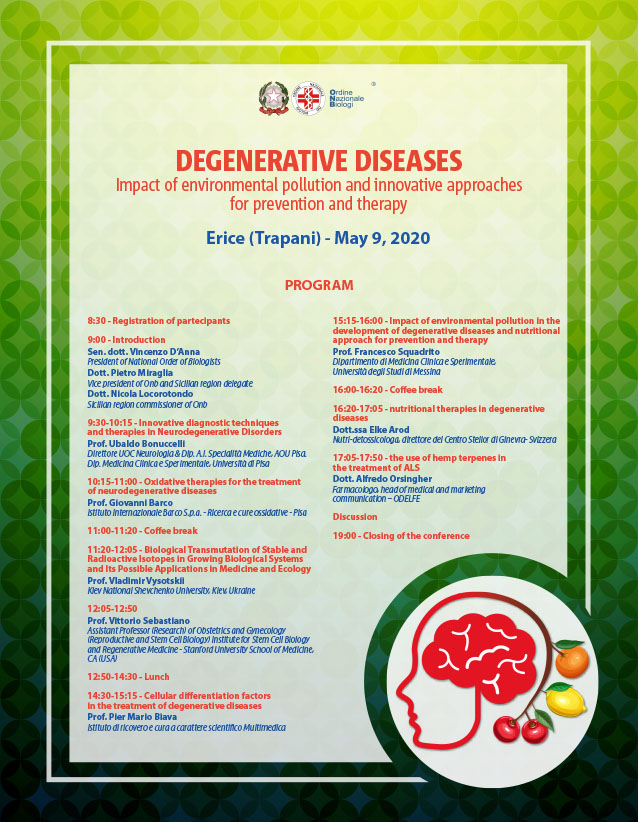CONFERENCE 9 MAGGIO 2020
LOCATION: ERICE (Trapani)
Presentation
The degeneration of nervous tissue is currently one of the most negative consequences of the prolongation of the average age associated with toxic environmental factors and improper lifestyles and eating habits.
The ever-growing increase in these pathologies in the over-65 population group is a major health emergency for our society: in 10 years (between 2005 and 2015) the number of people suffering from a form of dementia it increased from 7.5 to 15.6 per thousand people while patients suffering from Alzheimer’s disease rose from 4.5 to 9.4 per thousand people. For Parkinson’s disease it is estimated that around 230,000 people are affected in Italy; the prevalence of the disease is equal to 1-2% of the population over 60 years and to 3-5% of the population over 85 years.
These pathologies associated with aging are joined by those affecting between 20 and 40 years of age, such as multiple sclerosis (3400 new cases per year with an average prevalence of 188 cases per 100,000 people), the ALS for the age group between 50 and 60 years (an estimated 3,600 patients with ALS in Italy and about 1,000 new cases are diagnosed every year) and childhood neurological diseases often associated with rare but constantly increasing genetic defects (in Italy there would be about 2 millions of patients, most of them in the pediatric age).
In addition to strengthening the offer of facilities and services in the area to manage patients more effectively and support families, great hopes are placed in scientific research that is working on the one hand to identify biomarkers for early diagnosis and personalized pharmacological therapies, and on the other to the study of the link between environmental pollution, induction of damage that leads to the manifestation of neurodegenerative disease and the supply of nutrients and detoxifying substances through the nutritional approach.
Nutritional therapy in turn is supported by innovative technologies (study of nutrigenomics and nutrigenetics), by revolutionary scientific acquisitions in the field of epigenetics and low energy transmutations and by the deepening of biochemical mechanisms of action responsible for induction of the damage and the healing effects of the active ingredients contained in foods, such as hemp and bergamot.
The speakers who will participate in this important international conference promoted by the Order of Biologists will present the results of their research and their professional experience in the prevention and treatment of neurodegenerative diseases, focusing in particular on the link between environmental pollution, induction of damage to nervous tissue and nutrition. Precision medicine, the improvement of environmental health, and consequently of food quality, and personalized nutritional therapies can thus be integrated with each other to achieve together a single goal which is prevention and resolution as complete as possible of the serious and debilitating disability affecting patients with neurodegenerative diseases.






